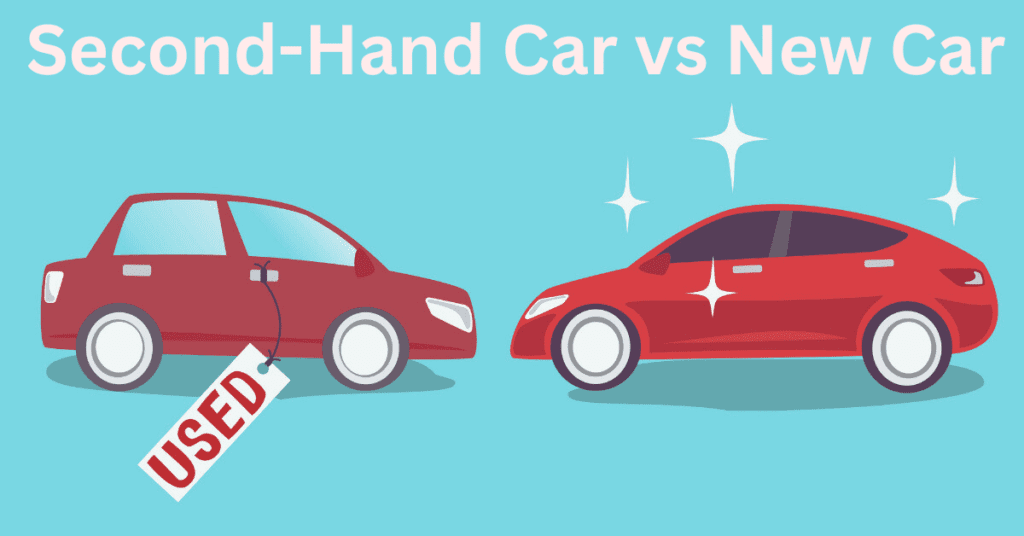Buying a car is a vital financial decision people make. One of the toughest newbie-derbies for buyers is between a second-hand car vs. new car. There are pros and cons for both options, although when to choose one over the other depends on a lot of factors such as budget, maintenance costs, depreciation, and value for money over time.
Before you decide, have these 5 most important factors to think about a new car or a second-hand car.

1. Cost Consideration
New Car:
- Costs are upfront; however, they are included with a well-rounded warranty and the newest bells & whistles.
- Other costs that may be included, such as registration and insurance tax, can widen the glasses.
- Typically Offers more favorable and lower interest rates in financing deals
- Offer fuel savings thanks to fresh engine technologies (in the long term).
Used Car:
- Comes in cheaper than a brand new car.
- Lower registration fees and insurers
- If the vehicle is not in good condition, it could amount to some surprise repair costs.
- Can be a good deal if you get it from the right source (read Certified Pre-Owned programs)
Verdict: A used car might be cheaper in budget terms, but a new car is guaranteed to have more finance options and long-term benefits.
2. Depreciation Factor
New Car:
- 30–50% depreciates in the first 3 years.
- The dash when a new car comes out the door starts depreciating significantly.
- Higher depreciation may have cost you more when you sold it.
Used Car:
- Has depreciated most (except keeping the same vehicle)
- For example, it holds better used vs. new for those cars well maintained.
- Demand for certain models can also slow the depreciation in the market.
Verdict: If you are trying to prevent big depreciation and still make an investment dollars out, a used car is the better deal.
3. Maintenance & Reliability
New Car:
- It comes with a manufacturer warranty, and parts are covered for regular maintenance & major repairs.
- Initial years require very little hassle in maintenance
- The access to the dealer network that provides parts identical to the one making claims
- Fewer breakdowns and unexpected downtime costs.
Used Car:
- May be prone to frequent repairs due to the age and condition of the car.
- The best way to get better reliability is to buy used from a certified dealer
- Costly: Older cars can even need expensive part replacements.
- Some models are pretty durable and could be a good used car.
Verdict: If you want it easy and to not stress yourself out, choose a new car. Save if you are willing to fix up occasionally and go the used-used route.
4. Insurance & Loan Costs
New Car:
- Because the vehicle is more expensive, general vehicle value.
- The downside of loan interest rates is often lower, but the total money being financed is higher.
- Gap insurance may be another coverage option you need as well.
Used Car:
- Insurance Premiums: Insurance is cheaper because the car costs less.
- Loan interest rates might be lower, but the options are somewhat limited.
- Not all banks are willing to give vehicle loans to a particular age.
Verdict: A cheap insurance and loan alternative is a used car, but financing can be tough sometimes.
5. Features & Technology
New Car:
- Come with the most recent safety technology, improved fuel economy, and integrated technology
- New entertainment systems, pure AI driving, and improved safety
- You can find several alternatives in eco-friendly versions as well, electric and hybrid models.
- Specifically includes infotainment and driver-assist systems software updates paid for by the manufacturer.
Used Car:
- Benefits may be missing the freshest functionality and technological advances.
- Still, some newer models (1-3 years old) might very well cost less and come with premium features.
- Old tech retrofit with new tech improvements such as infotainment rollouts.
- Less safety in older cars: Older vehicles may differ significantly from modern safety standards.
Verdict: The new car for you if you want advanced technology and safety features If you are ok with up-to-date tech and safety, get a new car.
A cheap used car, if well oversold, can be very techy!
Additional Considerations
Environmental Impact
- As cars get newer, they are fuel-efficient and have fewer emissions
- Most automakers are starting to offer better mileage and eco-friendly options like electric and hybrid vehicles.
- Sure, older cars can be a worse polluter, but buying used cars reduces manufacturing waste.
Customization & Personalization
- A new car permits you to choose features, colors, and hardware according to your likes.
- However used cars come as-is, the aftermarket should be your friend.
Resale Value & Future Investment
- Some brands and models tend to hold on to their value the best (new or used)
- A used car sold within a few years can be a lucrative thing, even if it is well settled.
Conclusion
New or used cars have both pros and cons. The answer should come based on your budget, long-term goals, and your tastes. Want the latest in tech, reliability, and low maintenance? Then get it now. But if you want value, lower depreciation, and cheaper insurance too, then a used car is the smart financial choice
Final Tip: Once you go for a used car, make sure to get the history, inspect thoroughly, and buy from an authentic dealer to avoid paying hidden in the vehicle. Similarly, if you are buying new, negotiate pricing and incentives with the salesperson at the dealerships.
The Psychology of Trading: 10 Important Rules for Success
Best Indicator strategy for Intraday trading | best intraday Indicator
